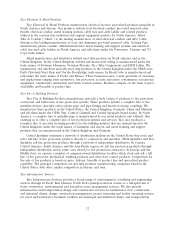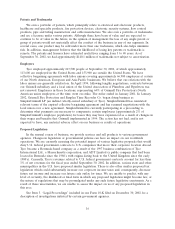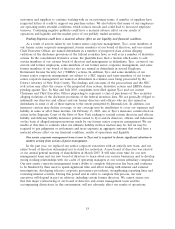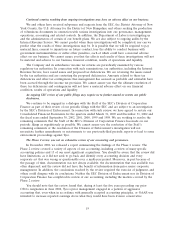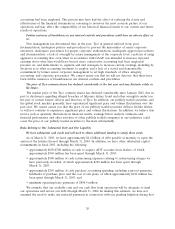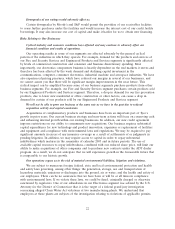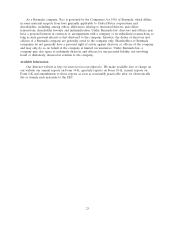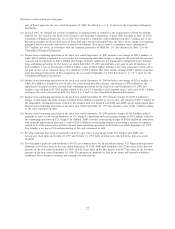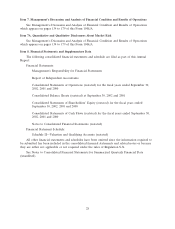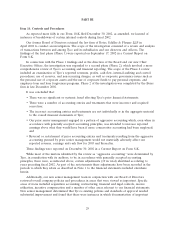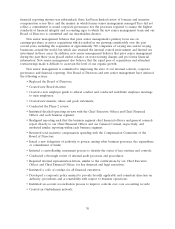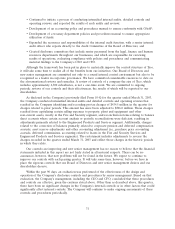ADT 2002 Annual Report Download - page 24
Download and view the complete annual report
Please find page 24 of the 2002 ADT annual report below. You can navigate through the pages in the report by either clicking on the pages listed below, or by using the keyword search tool below to find specific information within the annual report.Downgrades of our ratings would adversely affect us.
Certain downgrades by Moody’s and S&P would permit the providers of our receivables facilities
to cease further purchases under the facilities and would increase the interest cost of our credit facility
borrowings. It may also increase our cost of capital and make it harder for us to obtain new financing.
Risks Relating to Our Businesses
Cyclical industry and economic conditions have affected and may continue to adversely affect our
financial condition and results of operations.
Our operating results in some of our segments are affected adversely by the general cyclical
pattern of the industries in which they operate. For example, demand for the products and services of
our Fire and Security Services and Engineered Products and Services segments is significantly affected
by levels of commercial construction and consumer and business discretionary spending. Most
importantly, our electronics components business is heavily dependent on the end markets it serves and
therefore has been affected by the weak demand and declining capital investment in the
communications, computer, consumer electronics, industrial machine and aerospace industries. We have
also experienced pricing pressures, which have reduced our margins in several of our businesses, and
we cannot assure you that there will be significant margin improvements in the near future. This
cyclical impact can be amplified because some of our business segments purchase products from other
business segments. For example, our Fire and Security Services segment purchases certain products sold
by our Engineered Products and Services segment. Therefore, a drop in demand for our fire prevention
products, due to lower new residential or office construction or other factors, can cause a drop in
demand for certain of our products sold by our Engineered Products and Services segment.
We will not be able to grow our business at the same rate as we have in the past due to reduced
acquisition activity and capital constraints.
Acquisitions of complementary products and businesses have been an important part of Tyco’s
growth in prior years. Our current business strategy and near-term actions will focus on conserving cash
and enhancing internal growth within our existing businesses. In addition, our new credit agreement
imposes restrictions on our ability to consummate new acquisitions. Our business requires substantial
capital expenditures for new technology and product innovation, expansion or replacement of facilities
and equipment and compliance with environmental laws and regulations. We may be required to pay
significant amounts in excess of any insurance coverage as a result of settlements of or judgments in
pending litigation. In addition, we may require access to capital in order to repay substantial
indebtedness which matures in the remainder of calendar 2003 and in future periods. The use of
available capital resources to repay indebtedness, combined with our reduced share price, will limit our
ability to make acquisitions of other companies and to purchase new contracts under the ADT dealer
program. As a result, we do not anticipate that we will experience growth in the foreseeable future that
is comparable to our historic growth.
Our operations expose us to the risk of material environmental liabilities, litigation and violations.
We are subject to numerous foreign, federal, state and local environmental protection and health
and safety laws governing, among other things: the generation, storage, use and transportation of
hazardous materials; emissions or discharges into the ground, air or water; and the health and safety of
our employees. There can be no assurances that we have been or will be at all times in compliance
with environmental laws. If we violate these laws, we could be fined, criminally charged or otherwise
sanctioned by regulators. One of our subsidiaries in our Electronics segment was advised by the U.S.
Attorney for the District of Connecticut that it is the target of a federal grand jury investigation
concerning alleged Clean Water Act violations at two manufacturing plants. We understand that
employees at these plants are subjects of the investigation relating to violations of applicable permits,
22


